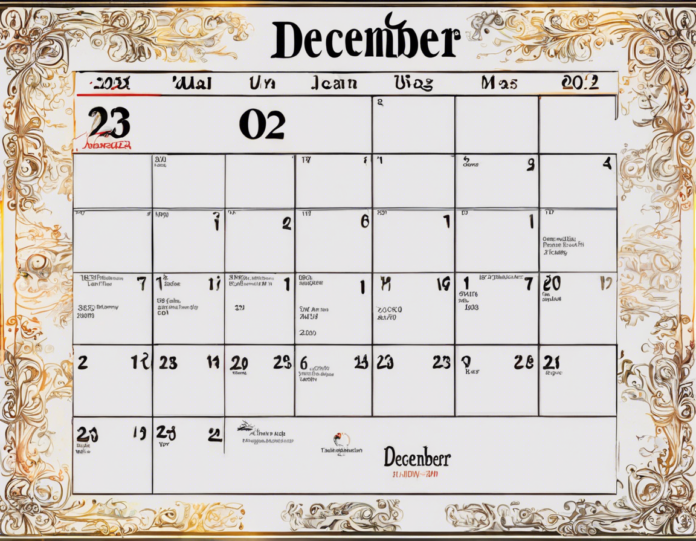As we approach the end of the year, December holds a special place in our hearts. It’s a time for reflection, celebration, and planning for the future. In this guide, we will delve into the significance of December as we explore holiday traditions, celebrations, and historical events that make this month unique.
The History of December
December is the twelfth and final month of the year in the Gregorian calendar. The name “December” comes from the Latin word “decem,” which means ten, as it was originally the tenth month in the Roman calendar. When January and February were added later, December retained its name even though it became the twelfth month.
Holiday Traditions
Christmas: Christmas is one of the most widely celebrated holidays in December. It is a time of giving, sharing meals with loved ones, and spreading joy and goodwill. Decorating Christmas trees, exchanging gifts, and enjoying holiday treats are all cherished traditions.
Hanukkah: Hanukkah, also known as the Festival of Lights, is a Jewish holiday celebrated in December. It commemorates the rededication of the Second Temple in Jerusalem and the miracle of the oil that burned for eight days.
Kwanzaa: Kwanzaa is an African American holiday that celebrates family, community, and culture. It is observed from December 26 to January 1, with each day focusing on a different principle such as unity, self-determination, and creativity.
Celebrations and Events
New Year’s Eve: While technically not in December, New Year’s Eve is a major celebration that marks the end of the year. It is a time for parties, fireworks, and making resolutions for the upcoming year.
Winter Solstice: The winter solstice, usually around December 21, is the shortest day of the year in the Northern Hemisphere. It marks the official beginning of winter and is celebrated in various cultures with festivals and rituals.
Important Dates in December
- December 7: Pearl Harbor Remembrance Day – Commemorates the attack on Pearl Harbor in 1941.
- December 25: Christmas Day – Celebrates the birth of Jesus Christ in Christian tradition.
- December 31: New Year’s Eve – The final day of the year, marked by celebrations and countdowns to midnight.
Fun Activities for December
- Ice Skating: Embrace the winter chill and go ice skating with friends and family.
- Baking: Try your hand at baking holiday cookies or festive treats.
- Movie Marathon: Curl up with a cup of hot cocoa and watch classic holiday films.
FAQs about December
1. What are some popular gifts for the holiday season?
Popular gifts during the holiday season include electronics, home goods, clothing, and personalized items like photo albums or engraved jewelry.
2. How can I give back during the holidays?
You can give back by volunteering at a local shelter, donating to charity, or participating in toy drives or food donation programs.
3. What are some traditional dishes for Christmas dinner?
Traditional Christmas dishes vary by culture, but some common ones include roasted turkey, ham, mashed potatoes, stuffing, cranberry sauce, and Christmas pudding.
4. Are there any superstitions or traditions associated with New Year’s Eve?
Various superstitions and traditions are associated with New Year’s Eve, such as kissing at midnight to ensure a year of love and good luck, or making loud noise to ward off evil spirits.
5. What is the significance of the winter solstice?
The winter solstice marks the shortest day and longest night of the year, symbolizing the rebirth of the sun and the gradual return of longer days. It is celebrated as a time of renewal and new beginnings.
December is a month filled with joy, reflection, and celebration. Whether you are exchanging gifts with loved ones, enjoying festive meals, or simply taking time to relax and unwind, embrace the spirit of the season and make memories that will last a lifetime.



